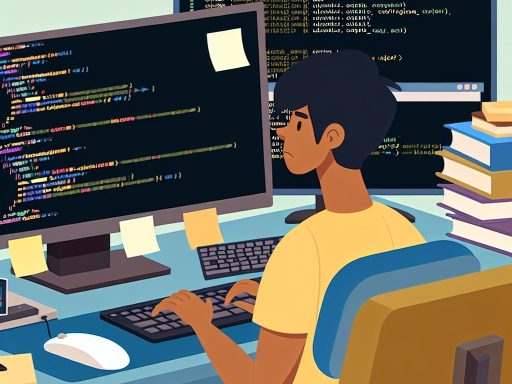Beginner’s Coding
Beginner’s Coding: A Guide for New Learners
Starting your journey in coding as a beginner can be exciting and challenging.
By understanding the basics, you can build a strong foundation.
Why Start with Coding?
1. High Demand for Coders
Coding skills are in high demand.
Many industries require programmers to build websites, apps, and software solutions.
Benefits:
- Career Opportunities: Coding opens doors to various job opportunities.
- Flexibility: Coders can work remotely or freelance.
- Innovation: Coding allows you to create and innovate.
2. Problem-Solving Skills
Coding enhances your problem-solving abilities.
It teaches you to think logically and systematically.
Key Points:
- Analytical Thinking: Coding helps break down complex problems.
- Creativity: You learn to find creative solutions.
- Persistence: Coding teaches resilience when facing challenges.
Getting Started with Coding
1. Choose a Beginner-Friendly Language
Beginner-friendly languages simplify the learning process.
They have straightforward syntax and extensive support resources.
Popular Choices:
- Python: Known for its readability and simplicity.
- JavaScript: Essential for web development.
- Scratch: Ideal for absolute beginners with visual coding blocks.
2. Understand the Basics
Grasping basic coding concepts is crucial.
Start with understanding variables, loops, and conditionals.
Core Concepts:
- Variables: Store data for use in your program.
- Loops: Repeat code blocks multiple times.
- Conditionals: Make decisions within your code based on conditions.
Practice Makes Perfect
1. Hands-On Coding
Practice is key to mastering coding.
Writing code regularly helps reinforce what you learn.
Practice Tips:
- Start Small: Begin with simple projects like calculators or to-do lists.
- Use Online Resources: Websites like Codecademy and freeCodeCamp offer interactive coding exercises.
- Join Coding Challenges: Participate in coding challenges to test your skills.
2. Build Personal Projects
Building projects helps you apply what you’ve learned.
Projects also enhance your portfolio, showcasing your abilities to potential employers.
Project Ideas:
- Personal Blog: Create a blog to share your coding journey.
- Simple Game: Develop a basic game using your chosen language.
- Webpage Design: Design and build a personal website.
Staying Motivated
1. Set Clear Goals
Setting clear goals keeps you motivated.
Define what you want to achieve with coding.
Goal Examples:
- Complete a Course: Finish an online coding course within a specific timeframe.
- Build a Project: Set a deadline to complete a personal project.
- Apply for Jobs: Start applying for coding jobs after building a portfolio.
2. Join a Community
Joining a coding community provides support and encouragement.
Interacting with other learners helps you stay motivated.
Community Options:
- Online Forums: Engage with others on platforms like Stack Overflow.
- Local Meetups: Attend coding meetups in your area.
- Social Media Groups: Join groups on Facebook or LinkedIn.
Conclusion
Beginning your coding journey requires dedication and a willingness to learn.
By starting with a beginner-friendly language, practicing regularly, and building projects, you can develop strong coding skills.
Set clear goals and stay motivated by joining a supportive community.
With consistent effort, you will progress from a beginner to a confident coder, ready to tackle more complex challenges in the tech world.









